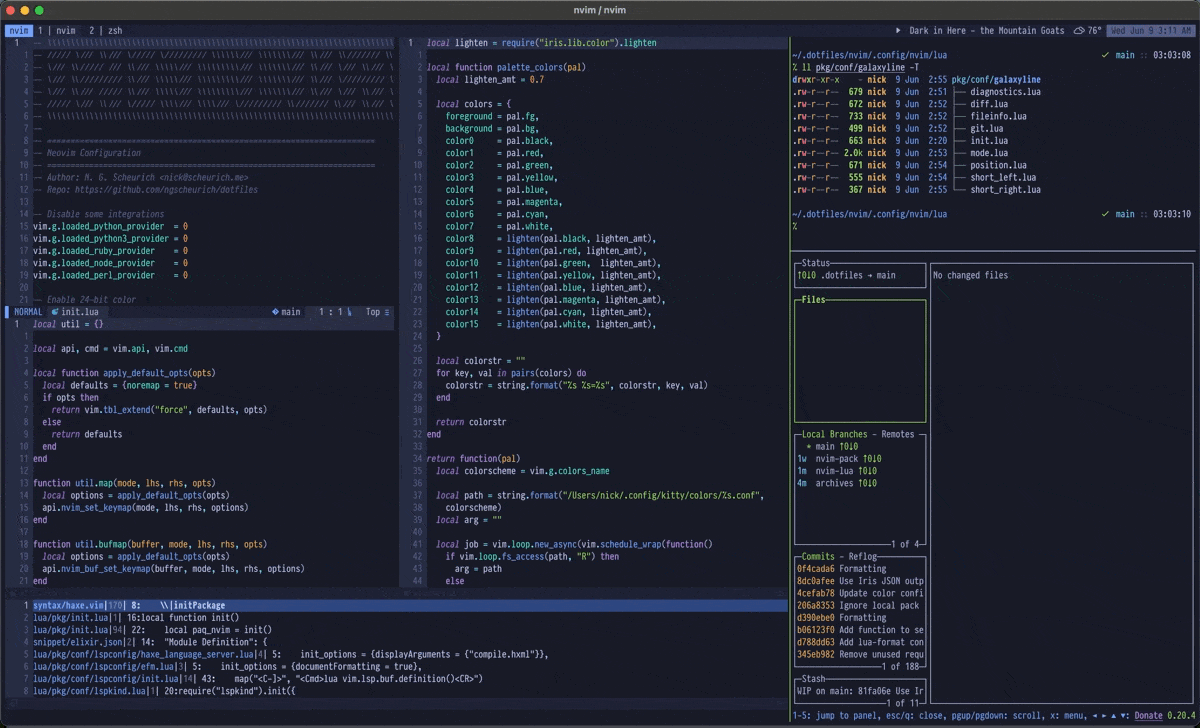Iris
Iris is a Neovim plugin that generates a normalized color palette based on your colorscheme. It is named for the goddess Iris of Greek mythology, personification of the rainbow.
Why?
My development environment consists of three primary tools: Neovim, tmux, and [kitty]. I like to try and keep the color settings of these tools synchronized against a single palette. This task, at the very least, means finding pre-built matching configuration files and more often means writing some of these files myself. This is a boring, error-prone process, which makes it a good candidate for automation. So here we are.
Overview
Iris gives you access to a Lua table representing a color palette with a set of known keys each time a colorscheme is loaded.
By specifying a series of callback functions, you can leverage this palette to automatically update the colors of Neovim as well as external programs. For example, I have callbacks in place to:
- Customize certain Neovim highlight groups
- Set my galaxyline colors
- Set my tmux colors using the tmux CLI
- Set my kitty colors using kitty’s remote control facility

Orthogonality
A tenet of lightline.vim which I admire is the concept of plugin orthogonality. lightline.vim describes it thusly:
The plugin does not rely on the implementation of other plugins. Such plugin crossing settings should be configured by users.
Iris extends this to external tools and, as such, includes no built-in color-changing functionality. Such behavior is beyond the scope and intent of this plugin, and is left to the end user to implement.
The Palette
An Iris palette is composed of a set of core colors based on the base16 architecture as well as some convenient aliases and a few specialized colors.
Conjuring
There are a few methods with which an Iris palette is brought forth, listed here in order of precedence:
- If you have created and specified a custom palette named the same as your colorscheme, Iris will use this data, filling in the gaps where necessary. A custom palette must define at minimum the sixteen core colors. You can see my custom Tokyo Night palette as an example.
- If the nvim-base16 plugin is available and you are using a
base16-*colorscheme, Iris will use the base16 colors defined by the plugin. - In every other scenario, the palette is derived from existing Neovim highlight groups. This usually works pretty well and makes Iris a hands-off solution in most cases.
Colors
An Iris palette contains a few groups of colors, described hereafter.
Base Colors
These are the core base16 colors, as defined by the base16 spec.
Aliases
These are aliases for base colors that make the palette table easier to work with. Some examples:
greenmaps tobase0Bbgmaps tobase00warnmaps tobase0A
Blends
These are derived by blending two colors together to varying degrees. For example, the cursorline color is base07 blended with a bit of base00, making it just slightly brighter than the background.
Shout out to folke’s Tokyo Night colorscheme for the blending functions used to implement this functionality.
Usage
The most basic Iris setup looks like:
require("iris").setup({})
This, however, isn’t terribly useful. Iris accepts a table of optional settings:
callbacks: A list of functions, each accepting an Iris palette as an argument, that will be run each time Iris generates a new palette. This is where the action is.palettes: A list of tables defining custom palettes for matching colorschemes.autocmd: If set tofalse, Iris will not add an autocommand to regenerate the palette and run the callbacks on theColorSchemeevent. This can be done manually by running:lua require("iris").load().
The following setup will display the Iris palette each time it is generated and use a custom palette for the Srcery colorscheme:
require("iris").setup({
callbacks = {
function (pal) print(vim.inspect(pal) end,
},
palettes = {
srcery = require("my_srcery_palette"),
}
})
Portabilty
The iris module provides a json function that returns the current palette as a JSON-encoded string. This is handy for passing color settings off to external programs.
Examples
- An Iris callback and shell script to keep tmux in sync with Neovim
- An Iris callback to keep kitty in sync with Neovim
- Using Iris to set some Neovim highlights




